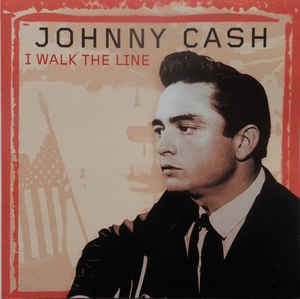For this week, we are looking at chapter 1 (Bound for the Promised Land) and chapter 2 (I Walk the Line) of Richard Beck’s Trains, Jesus, and Murder – The Gospel According to Johnny Cash.
In chapter two, our biography of Cash begins with his move to Memphis and his being signed to Sun Records in 1955. His recording career met with immediate success. Johnny Cash was becoming a star; however, his wife Vivian became concerned over his success and his budding rock ‘ n ‘ roll lifestyle. Cash initially wrote “I Walk the Line” to reassure Vivian that he would also be faithful. In a later interview, Cash shared that “I Walk the Line” was also his first recorded Gospel song. He said that in this song, he expressed his continued spiritual allegiance to God’s will and to walk the line for God. Listen to the song both as a romantic ballad and as a Gospel song.
However, as Merle Haggard noted, “Johnny Cash was out of line all of his life.” Soon after recording the song (and ironically thanks to the song’s commercial success), Cash soon developed a reputation as a womanizer and a pill taker. Like other music stars in history, Cash soon found himself addicted to alcohol and amphetamines, divorced from his wife, estranged from this children, and on the brink of suicide. Cash had shattered the promises made to his wife and to his God in his song.
But in the life of Johnny Cash and “I Walk the Line,” we find the Gospel. Paul tells us that we “have all sinned and fallen short of the Glory of God.” Rom. 3:23. In the story of Johnny Cash’s fall, we can see our own. The Good News of Jesus Christ, however, is that our salvation lies not in our walking the line for God, but in God, through Christ, walking the line for us. As Beck (and Paul) remind us, we first see God’s willingness to walk the line for us in the story of Abraham. Rom. 4, Gal. 3.
In the Ancient Near East of the book of Genesis, contracts were formalized by bisecting animals and then having the contractual parties walk the line between the two halves. This symbolized that if the contractual obligation is broken, then the same shall be done to the breaching party. In Genesis 15, the Scriptures tell us that God made the promise to Abraham that his descendants would be more numerous than the stars in the sky and would inherit the Promised Land. This Divine promise is unilateral – only God is obligated to perform. This promise is sealed with Abram cleaving the animals in two, but only God walking the line through the carcasses. Abraham and his descendants are under no obligations.
The Good News is that we are the descendants of Abraham, and we are not bound by any legal obligations. Gal. 4. The law is the bringer of God’s wrath. Rom. 4:15 Johnny Cash’s vow to God to walk the line could not bring about his salvation even if he lived up to his promises. As James writes, if we keep the whole law and yet stumble on just one point, we have broken the whole law and are subject to God’s wrath. Jam. 4:10 Rather, Johnny Cash’s salvation and our salvation are not dependent upon us walking the line because God in Christ walked the line for us. It is God’s faithfulness, not ours, upon which our hope is based. Jordan’s bank is stormy because of us, but we are bound for the promised land because of Jesus.
As you read the lyrics below, think of them as being sung by Christ to you.
I find it very, very easy to be true
I find myself alone when each day is through
Yes, I’ll admit that I’m a fool for you
Because you’re mine, I walk the line
As sure as night is dark and day is light
I keep you on my mind both day and night
And happiness I’ve known proves that it’s right
Because you’re mine, I walk the line
You’ve got a way to keep me on your side
You give me cause for love that I can’t hide
For you I know I’d even try to turn the tide
Because you’re mine, I walk the line
I keep a close watch on this heart of mine
I keep my eyes wide open all the time
I keep the ends out for the tie that binds
Because you’re mine, I walk the line
Because you’re mine, I walk the line
Because you’re mine, I walk the line
Husbands, love your wives, as Christ loved the church and gave himself up for her, that he might sanctify her, having cleansed her by the washing of water with the word, that he might present the church to himself in splendor, without spot or wrinkle or any such thing, that she might be holy and without blemish. Eph. 4:25-27

